18 games from the early golden age of iPhone gaming (that you can still play)
Enjoy some decade-old iPhone games
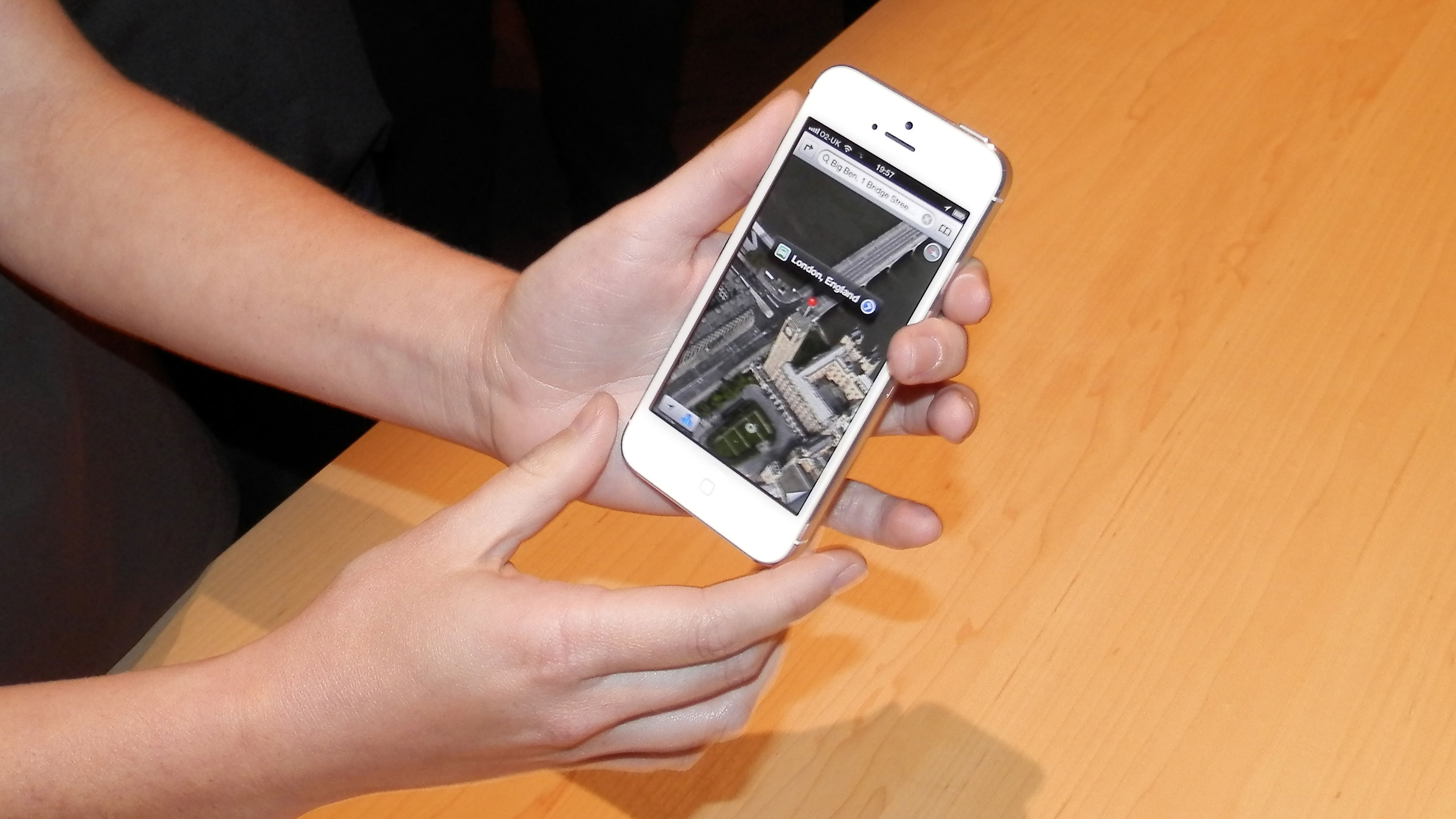
A huge number of iPhone games have been removed from the App Store. You may never be playing them in their original form again. Flight Control, Monkey Island, Tap Tap Revolution, JellyCar, Star Defense and Glyder 2 — these are just a few of the classic games you can no longer download for your iPhone.
However, a greater number of titles from the first four years of the App Store are still available to play, and these are what we want to highlight here.
Why go back 10 years to find games? iPhone games from the 2009-2012 era typically avoid the free-to-play money-making tactics of many of the latest titles. And, thanks to updates from the developers and iPhone retro maestro GameClub, we think most of them have barely aged.
To pare down the list we’ve avoided games that still ride high in the charts, such as Angry Birds and Temple Run. We’re here to highlight games you may have forgotten about, or never really knew about in the first place. Drop your loot box and get ready for some of the iPhone gaming classics from years gone by.
Rolando: Royal Edition (2008)
- App Store | $0.99
Rolando should have been one of the original “killer apps” of the iPhone. It was part of an experiment by publisher ngmoco to see if people would pay for premium iPhones games. While revered as a cult classic, it was initially only a modest hit, having arrived just a few months after the App Store’s launch.
It’s an intensely cute platforming adventure in which you control a cast of little round folk by tilting your iPhone. Rolando was pulled from the App Store in 2017, but returned in 2019 with the Royal Edition you can buy today, for just a fraction of the original’s cost. It’s a remastered version, although the sequel Rolando 2 remains lost.
Space Miner: Space Ore Bust (2010)
- GameClub | requires subscription
You can thank GameClub for the continuing existence of Space Miner: Space Ore Bust. GameClub keeps classic iPhone games updated, taking the pressure off developers to maintain software they made a decade or more ago.
Get daily insight, inspiration and deals in your inbox
Sign up for breaking news, reviews, opinion, top tech deals, and more.
Space Miner is a space exploration, mining and combat game, packed with humor and fun characters that add real charm to the narrative-led mission structure. However, upgrading your ship is a big part of what keeps you coming back. You mine asteroids for materials, which you then use to improve your ship’s weapons, maneuverability and shields. It uses twin-stick controls, with the added inertia of a spacecraft flying through the zero gravity blackness of space.
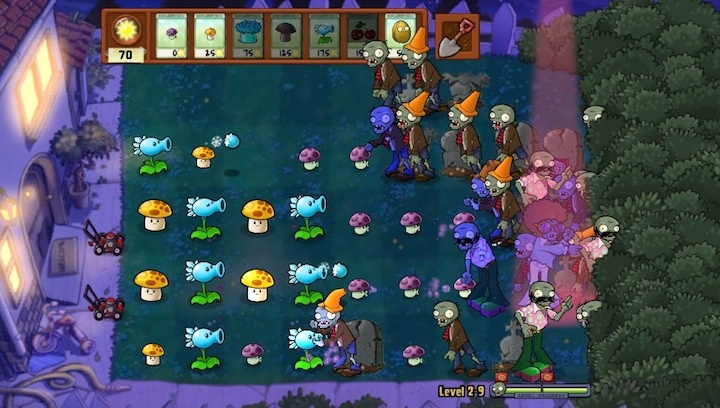
Plants vs Zombies (2010)
- App Store | Free
These days, you might think of Plants vs Zombies as an EA franchise, but back in 2008 it was classic PopCap, the developer/publisher acquired by EA in 2011. PopCap was a master of progression and reward in casual games, and PvZ is a great example of this in action.
It’s a tower defense title of sorts, in which you protect your house from invasion by zombies. Instead of mounting guns, you plop down plants that, well, are basically guns, and let them blast away at the undead. Levels play out along lanes rather than an open battlefield or a winding route, making PvZ as much a puzzle game as a tower defense.
Cut the Rope (2010)
- App Store | Free
Cut the Rope represents an altogether healthier time in mobile casual gaming. It was a breakout hit, seen being played by countless people on the work commute, but it was actually rather smart.
It combines a cute central character, the green monster Om Nom, with the physics-based puzzling that was popular at the time. You use timing and inertia to fling candies up into Om Nom’s mouth by cutting the ropes holding those sweets in the air. It turns each level into a miniature brain-teaser. Cut the Rope starts off fairly easy, but the 300 levels go on to provide a stiff challenge.
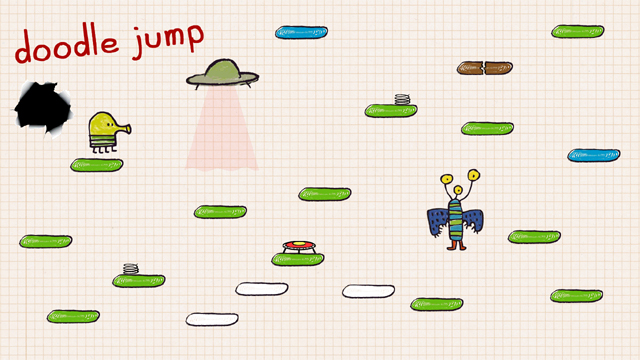
Doodle Jump (2009)
- App Store | Free
Many of you may have played Doodle Jump already. It was a casual smash, and a mainstay of the download charts for years. Relying largely on skill rather than collecting coins for seemingly limitless upgrades, it’s a pure endless runner-style game.
However, the format is a little different to the norm. Your character jumps up platforms, and you tilt the iPhone laterally to ensure the little guy doesn’t fall through the bottom of the screen. You collect time-limited power-ups, such as jump springs, to make faster progress; but the way you need to get good at the game to increase your scores shows it’s truly a game of 2009, not 2022.
Where’s My Water? (2011)
- App Store | Free
Disney’s Where’s My Water? offers the kind of gameplay you might see in “fake” mobile games adverts online today. You dig through the earth to create a path for water to reach the bath of alligator Swampy, who lives underground and wants a wash, apparently.
Taking inspiration from previous hits such as Cut the Rope and Angry Birds, there’s a strong physics element here that makes play feel alive. Disney did briefly ruin the game with a free-to-play-style energy system, but was restored to its former glory following a barrage of complaints. It’s simple, but the water physics demand experimentation, which keeps play fresh and bubbly.
Enigmo (2008)
- App Store | $1.99
Pangea software’s Enigmo was one of the original “smart” iPhone games. Water, lava and oil drip from containers in each level and you need to create a path for each using a Rube Goldberg-esque arrangement of platforms and tools that bounce each stream into the air.
This title was actually released five years earlier for Mac and PC, but it found a whole new audience on iOS. Playing back through its first levels, Enigmo combines the physics feel of later games such as Cut the Rope with the slightly zany edge of a PC classic such as The Incredible Machine.
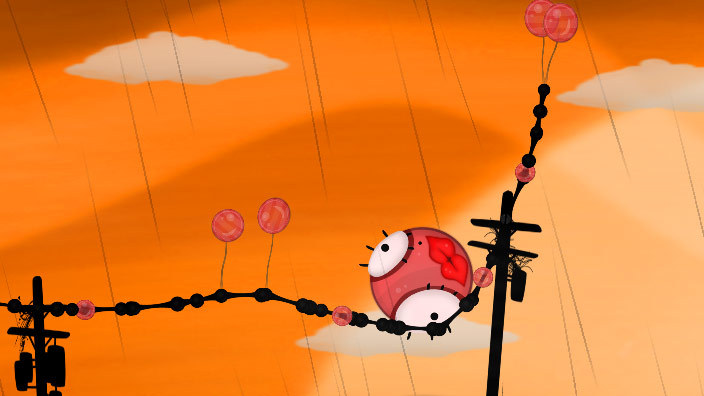
World of Goo (2010)
- App Store | $4.99
Bridge-builder games are often quite dry, generating screenshots that look like those of an architecture sim. Despite being one of the earliest in the genre, World of Goo is nothing like those contemporaries.
It sees you make bridges and other structures; but your building blocks are sentient blobs of goo that interconnect when placed close enough to each other. These structures then become a ladder or path for the other blobs of goo to use to reach the exit of each level. World of Goo is charming, just the right amount of “weird”, and based around a physics engine that’s coherent enough to make this a rewarding and intelligent puzzler.
Labyrinth 2 (2009)
- App Store | $4.99
The original Labyrinth was the number one early showcase for the iPhone’s accelerometer motion sensor. It was a virtual wooden maze toy, in which you guide a metal ball past obstacles to the goal by tilting your phone.
Tilt control in mobile games is deeply unfashionable these days, but games such as Labyrinth show how neat the underlying technology really is. Labyrinth is no longer available, but you can get your hands on its sequel, Labyrinth 2, from 2009. It has the same visual style, but introduced more level mechanics. It’s aged beautifully — helped by its support for high-res screens.
Tiny Wings (2011)
- App Store | $1.99
You may remember Flappy Bird, a 2013 viral mobile game in which you tap the screen to awkwardly navigate a bird between pipes. Lone developer Andreas Illiger made something far more beautiful and engaging along similar lines two years earlier in Tiny Wings.
Press the screen to make the bird dive, timing the descents so that the little thing glides into smoothly curved valleys to be launched far into the air. It’s an endless runner, where each run ends at nightfall, which can be delayed by picking up sun tokens. Where some titles in this genre are stress-fests, Tiny Wings has a much more relaxing vibe.
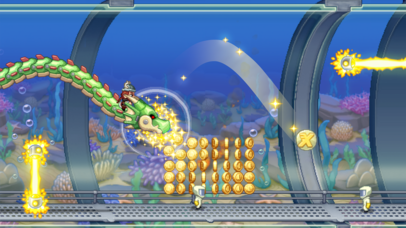
Jetpack Joyride (2011)
- App Store | Free
Halfbrick’s Jetpack Joyride is a contender for the best iPhone endless runner made to date, more than 10 years on. It feels far more like an actual game than most, with visuals and character movements that seem inspired by arcade classic Metal Slug.
You’re a chap escaping from an enemy base, using a jetpack that shoots bullets into the ground as you fly up into the air. These don’t actually make much of an impact on play, since your main aim is to collect coins and pick-ups while avoiding missiles, electrifying lines and other nasties. Jetpack Joyride nails its pacing, not only in terms of basic movement, but also in terms of how quickly you can get into a run and the rate at which you complete objectives, which level up your character. This pacing is tripped up by ads, though – unless you pay not to see them.
Superbrothers: Sword & Sworcery (2011)
- App Store | $3.99
More than a decade on from its release, Superbrothers: Sword & Sworcery remains one of the most “hipster” iPhone games. The occasionally cloying self-referential script is the one potential hurdle you may have to get over to appreciate this atmospheric and engaging audio-visual adventure.
Roll with it, though, and you’ll find a relaxing experience that sucks you into the iPhone’s screen. It’s strongly recommended to play with headphones, since the stereo mix of the soundtrack has an important role in weaving the game’s ambiance. Play is split into manageable chapter-styler chunks, where the sections that see you largely navigate your character around a magic-tinged world are broken up by simple but surprisingly tense combat sections.
Fieldrunners (2008)
- App Store | $2.99
The original poster child of the iPhone tower defense craze, Fieldrunners can seem simplistic next to a more recent smash such as Bloons TD 6. However, unlike many TD titles, Fieldrunners leaves you to fill a mostly empty field with your units. You create the path, rather than just posting troops along a set line.
Its visuals are as good-looking as ever, and while Fieldrunners lacks the long-term appeal of some later titles in the genre, this was perhaps the most influential. It’s worth experiencing just as a slice of iPhone history: the game arrived just three months after the App Store opened.
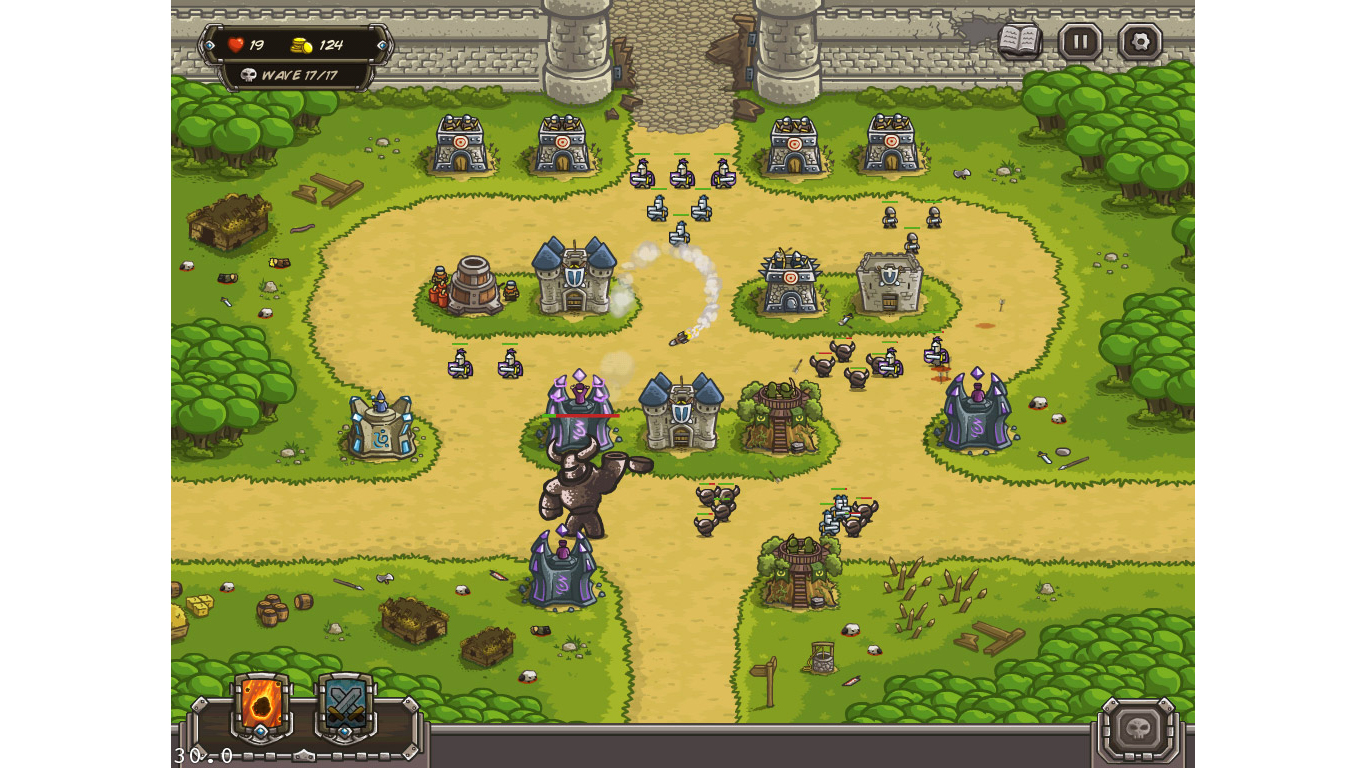
Kingdom Rush (2012)
- App Store | Free
Fieldrunners may have been the most famous tower defense iPhone game during the App Store's early years, but Kingdom Rush is a deeper and ultimately more satisfying take on the genre. It’s a completely different one, too. Each level has set points where towers can be placed.
Choosing which tower to place where, and when to upgrade it, are the key to a successful strategy. But as each level heats up, you have to get hands-on, manually placing supplementary units and firing off spells. This gives you a closer connection to the action, and Kingdom Rush’s production values are excellent too.
Spider: The Secret of Bryce Manor (2009)
- GameClub | requires subscription
Spider: The Secret of Bryce Manor could be found on several mobile game of the year lists back in 2009. It was an exploration of the possibilities of touchscreen gaming, letting you control a spider, flicking the screen to make it jump across the surfaces of an abandoned manor.
It’s inventive to this day, and there’s a story to uncover if you pay attention to the environment around you. Developer Tiger Style kept the game up-to-date for several years, but the responsibility has since been shifted to GameClub, which released a remastered version of Spider: The Secret of Bryce Manor, including “redrawn” sprites and backgrounds to make the best use of today’s high-res screens. This one is best played on an iPad, so your finger swipes obscure less of the display.
Edge (2008, 2009)
- App Store | $2.99
This was one of the early App Store critical darlings, and picked up a stack of awards back in 2008 and 2009. You roll a cube around a maze, picking up glowing bricks and carefully timing your move as platforms shift around you.
The deliberately clunky motion of the cube gives Edge a distinctive feel, one much more casual and commuter-friendly than the accelerometer-based rolling ball maze puzzlers that were fairly common back in those early years. You can move the block by either using the default touchscreen slide gestures or a virtual D-pad — a more ordinary approach, but comfortably familiar if you don’t initially get on with the control scheme.
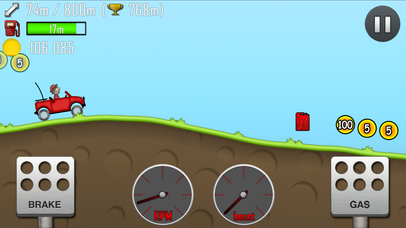
Hill Climb Racing (2012)
- App Store | Free
This is one of the later picks in our golden iPhone gaming era roundup, but Hill Climb Racing’s style is very much lo-fi. You control a vehicle using just two buttons: the accelerator; the brake. But these also tilt the car or bike backwards and forwards slightly, which is crucial – because every few seconds you’re tasked with scaling a tricky hill, valley or jump.
Upgrades are what compel you to keep playing over successive runs. Your initial car can’t actually get that far, even if you’re a master of Hill Climb Racing’s virtual buttons. You pick up currency to upgrade the engine, suspension, tires and 4WD effectiveness, and eventually go on to unlock new “tracks”, including the deliciously low-gravity moon, and a now-huge array of vehicles with different properties. Intensely moreish, this one.
The Quest (2009)
- App Store | $7.99
We’re dealing with throwbacks in this article, but 2009’s The Quest was “retro” when it first arrived in the App Store. It’s an RPG dungeon crawler inspired by grid-based games from the 1990s, such as the Might and Magic series, Eye of the Beholder and The Bard’s Tale.
Not only is the main game itself massive, Redshift games has also made numerous expansion packs for it over the years. The original pixelated graphics were replaced in an HD remaster from 2016, making The Quest look more like a Legend of Grimrock alternative than a mid-90s reject — lovely as the original graphics were. The grid-based movement also makes The Quest feel more at home on a phone screen than it would with Skyrim-style free-roaming.
Andrew is a freelance journalist and has been writing and editing for some of the UK's top tech and lifestyle publications including TrustedReviews, Stuff, T3, TechRadar, Lifehacker and others.
